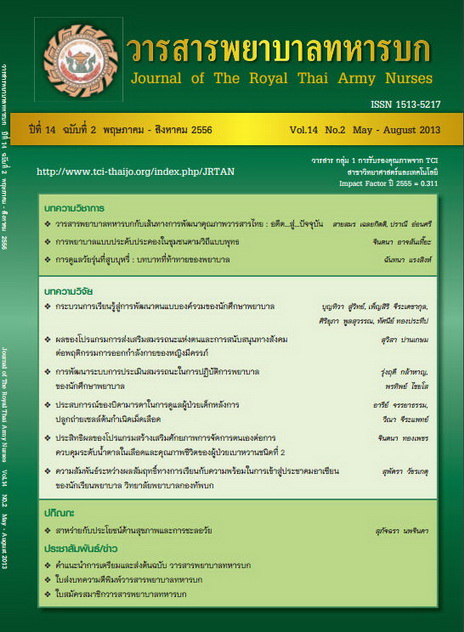ประสิทธิผลของโปรแกรมสร้างเสริมศักยภาพการจัดการตนเองต่อการควบคุมระดับน้ำตาลในเลือดและคุณภาพชีวิตของผู้ป่วยเบาหวานชนิดที่ 2 Effectiveness of Self-Management Promoting Potential Program on Blood Sugar Control and Quality of Life Among Diabetes Mellitus Type2
Keywords:
โปรแกรมสร้างเสริมศักยภาพการจัดการตนเอง, ระดับน้ำตาลในเลือด, คุณภาพชีวิต, ผู้ป่วย เบาหวานชนิดที่ 2, Self - Management promoting potential program, blood sugar control, Quality of life, Type II Diabetes Mellitus patientsAbstract
บทคัดย่อ
การวิจัยครั้งนี้มีวัตถุประสงค์เพื่อเปรียบเทียบจำนวนผู้ป่วยเบาหวานที่สามารถควบคุมระดับน้ำตาลในเลือดได้และคุณภาพชีวิตของผู้ป่วยเบาหวานก่อนและหลังได้รับโปรแกรมสร้างเสริมศักยภาพการจัดการตนเองและเปรียบเทียบจำนวนผู้ป่วยเบาหวานที่สามารถควบคุมระดับน้ำตาลในเลือดได้และคุณภาพชีวิตของผู้ป่วยเบาหวาน ระหว่างกลุ่มที่ได้รับโปรแกรมสร้างเสริมศักยภาพการจัดการตนเองกับกลุ่มที่ไม่ได้รับโปรแกรมฯ กลุ่มตัวอย่างเป็นผู้ป่วยเบาหวานชนิดที่ 2 ที่มารับการรักษาที่คลินิกเบาหวานแผนกผู้ป่วยนอกโรงพยาบาลชุมชน จังหวัดเพชรบุรี จำนวน 30 คน สุ่มเข้ากลุ่มทดลองและกลุ่มควบคุม โดยคำนึงถึง เรื่อง เพศและชนิดยาเบาหวาน กลุ่มทดลองได้รับโปรแกรมสร้างเสริมศักยภาพการจัดการตนเองส่วนกลุ่มควบคุมได้รับการพยาบาลตามปกติ เครื่องมือที่ใช้ในการวิจัย ได้แก่ โปรแกรมการสร้างเสริมศักยภาพการจัดการตนเองและแบบสอบถามคุณภาพชีวิตซึ่งผ่านการตรวจสอบความเหมาะสมของการจัดกิจกรรม ความตรงเนื้อหาและหาค่าความเที่ยงได้ 0.80 วิเคราะห์ข้อมูลโดยใช้สถิติ เชิงพรรณา โดยการหาค่าเฉลี่ย ส่วนเบี่ยงเบนมาตรฐาน แมคนีมาไคสแคว์และสถิติทดสอบที (t-test ) ผลการวิจัยพบว่า
1.จำนวนผู้ป่วยเบาหวานที่สามารถควบคุมระดับน้ำตาลในเลือดได้ภายหลังรับโปรแกรมสร้างเสริมศักยภาพจัดการตนเองมีมากกว่าก่อนได้รับโปรแกรมฯ อย่างมีนัยสำคัญทางสถิติ ( p<.05)
2.คุณภาพชีวิตของผู้ป่วยเบาหวานกลุ่มทดลองหลังรับโปรแกรมสร้างเสริมศักยภาพจัดการตนเองสูง กว่าก่อนได้รับโปรแกรมฯ อย่างมีนัยสำคัญทางสถิติ ( p<.05)
3.จำนวนผู้ป่วยเบาหวานที่สามารถควบคุมระดับน้ำตาลในเลือดได้ในกลุ่มที่ได้รับโปรแกรมสร้างเสริมศักยภาพการจัดการตนเองกับกลุ่มที่ไม่ได้รับโปรแกรมฯ ไม่มีความแตกต่างอย่างมีนัยสำคัญทางสถิติ ( p<.05)
4.คุณภาพชีวิตของผู้ป่วยเบาหวานในกลุ่มทดลองสูงกว่ากลุ่มควบคุมอย่างมีนัยสำคัญทางสถิติ ( p<.05)
Abstract
The purposed of this quasi-experimental research were 1) to compare the number of patients with Diabetes Mellitus in experimental group who could control blood sugar and quality of life before and after received the program and 2) to compare the number of patients with Diabetes Mellitus who could control blood sugar and quality of life between the experimental group and control group. Thirty type 2 diabetes mellitus patients in the Diabetic clinic at Out-patient Department, Community Hospital were assigned by matched pair into either experimental or control group. There were 15 patients in each group. The instruments used in the study include (1) Self- management Promoting Potential Program (2) Quality of Life Questionnaire. These instruments were tested for both validity and reliability with alpha of.80. Data were analyzed by using mean, standard deviation, McNemar test, chi-square test and pair t-test. The major findings were as follow
1. The number diabetes mellitus patients who could control blood sugar after receiving the Potential program larger than those before receiving the Potential program (p < .05)
2. The quality of life of diabetic mellitus patients after receiving the Potential program was significantly higher than those before receiving the Potential program (p < .05)
3. There were no significant difference between the number Diabetes Mellitus patients who could control blood sugar between the experimental group and control group
4. The quality of life of diabetic mellitus patients in the experimental group higher than those in control group (p < .05)Downloads
Downloads
Published
How to Cite
Issue
Section
License
บทความหรือข้อคิดเห็นใดใดที่ปรากฏในวารสารพยาบาลทหารบกเป็นวรรณกรรมของผู้เขียน ซึ่งบรรณาธิการหรือสมาคมพยาบาลทหารบก ไม่จำเป็นต้องเห็นด้วย
บทความที่ได้รับการตีพิมพ์เป็นลิขสิทธิ์ของวารสารพยาบาลทหารบก
The ideas and opinions expressed in the Journal of The Royal Thai Army Nurses are those of the authors and not necessarily those
of the editor or Royal Thai Army Nurses Association.






